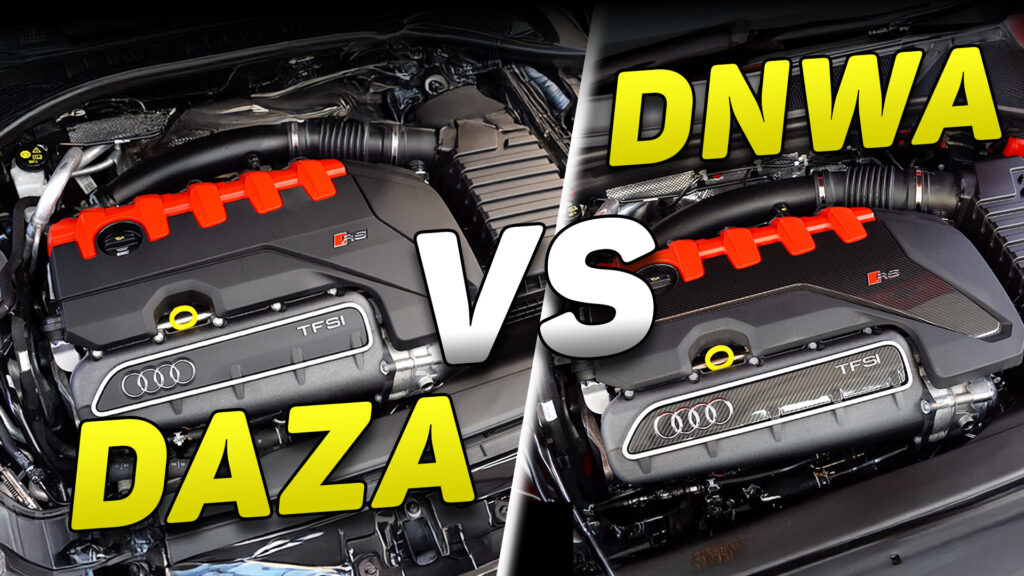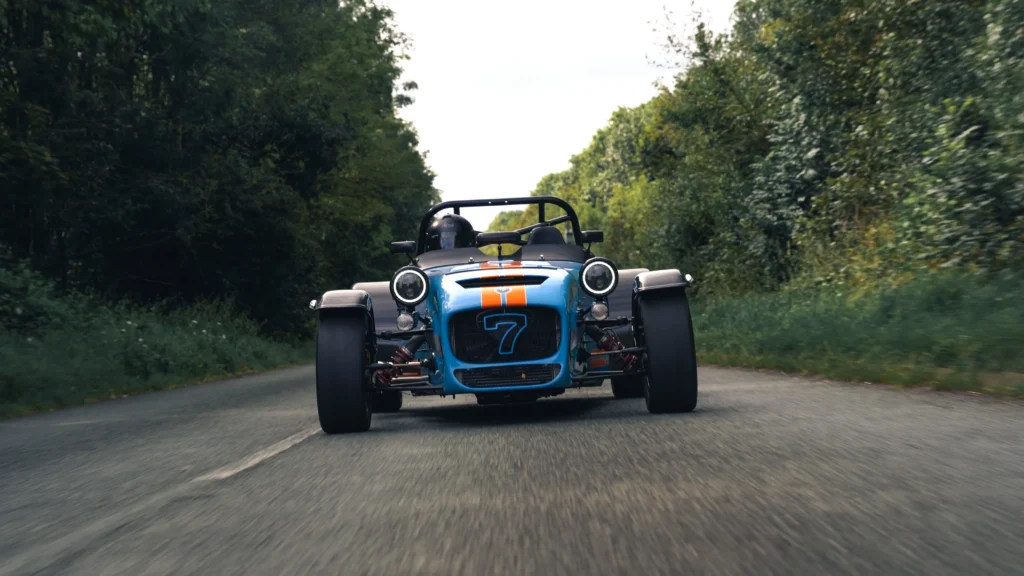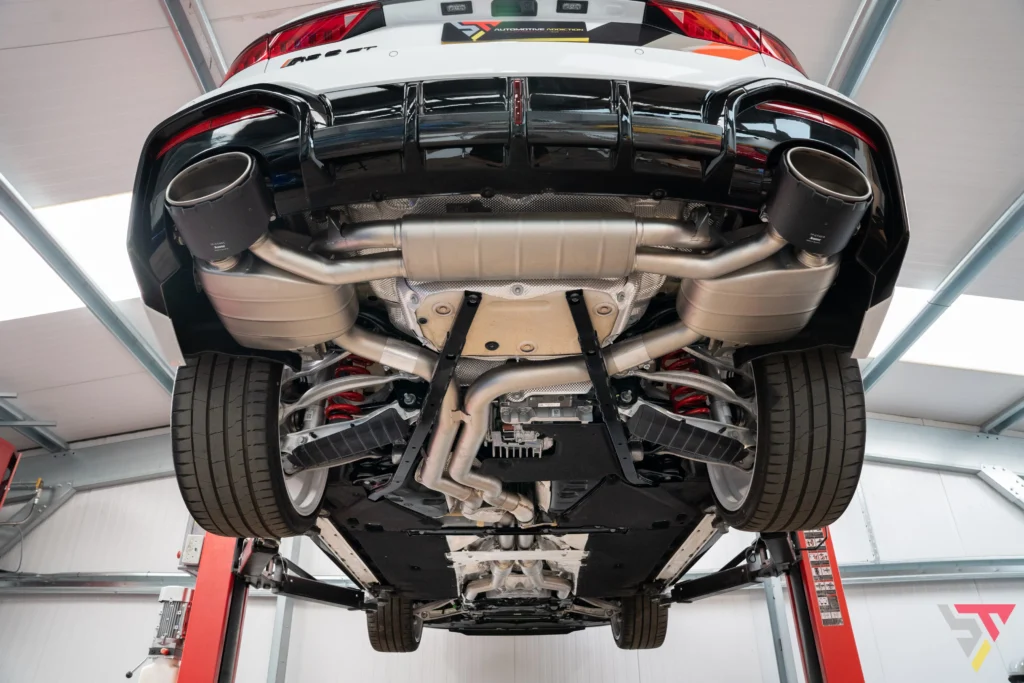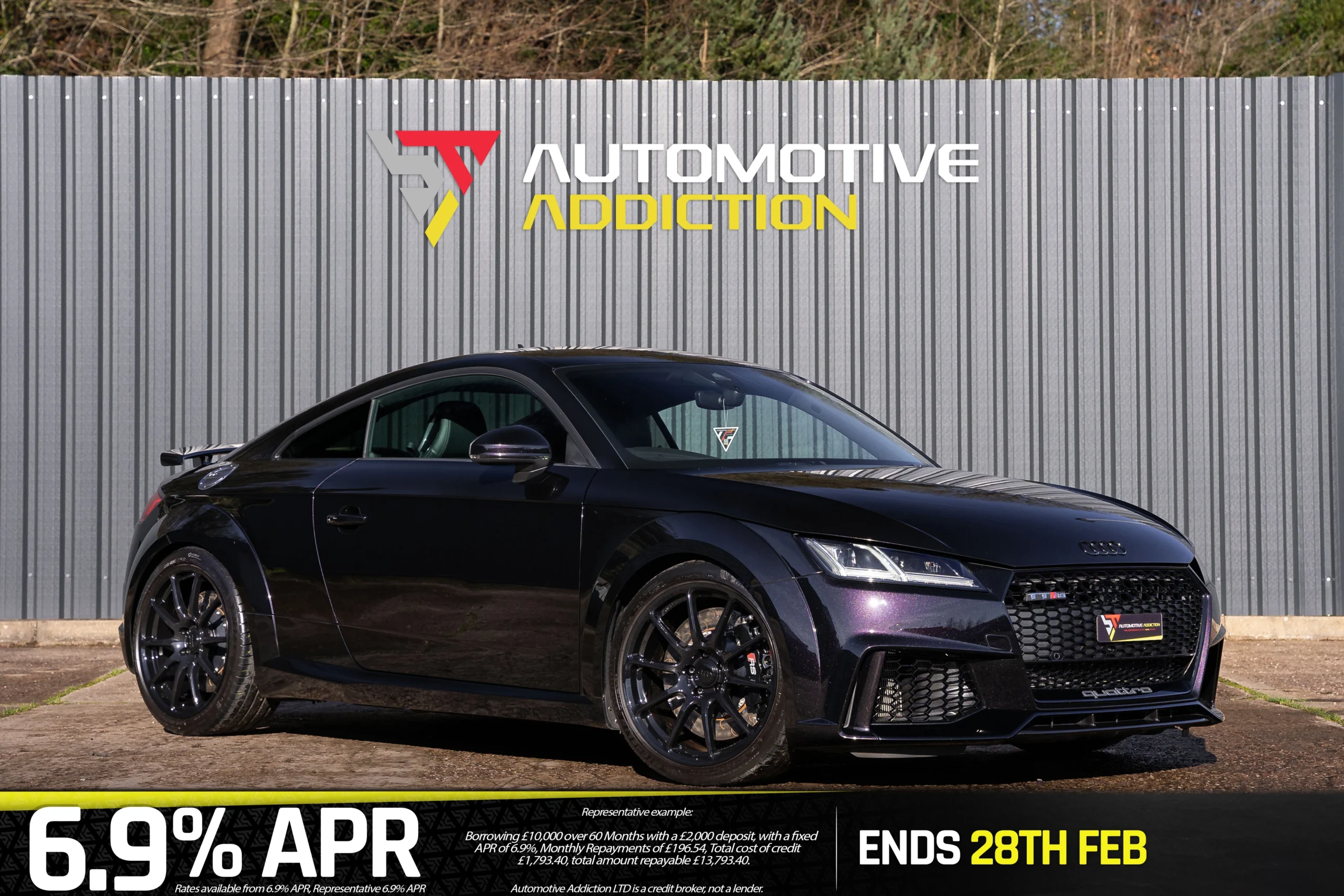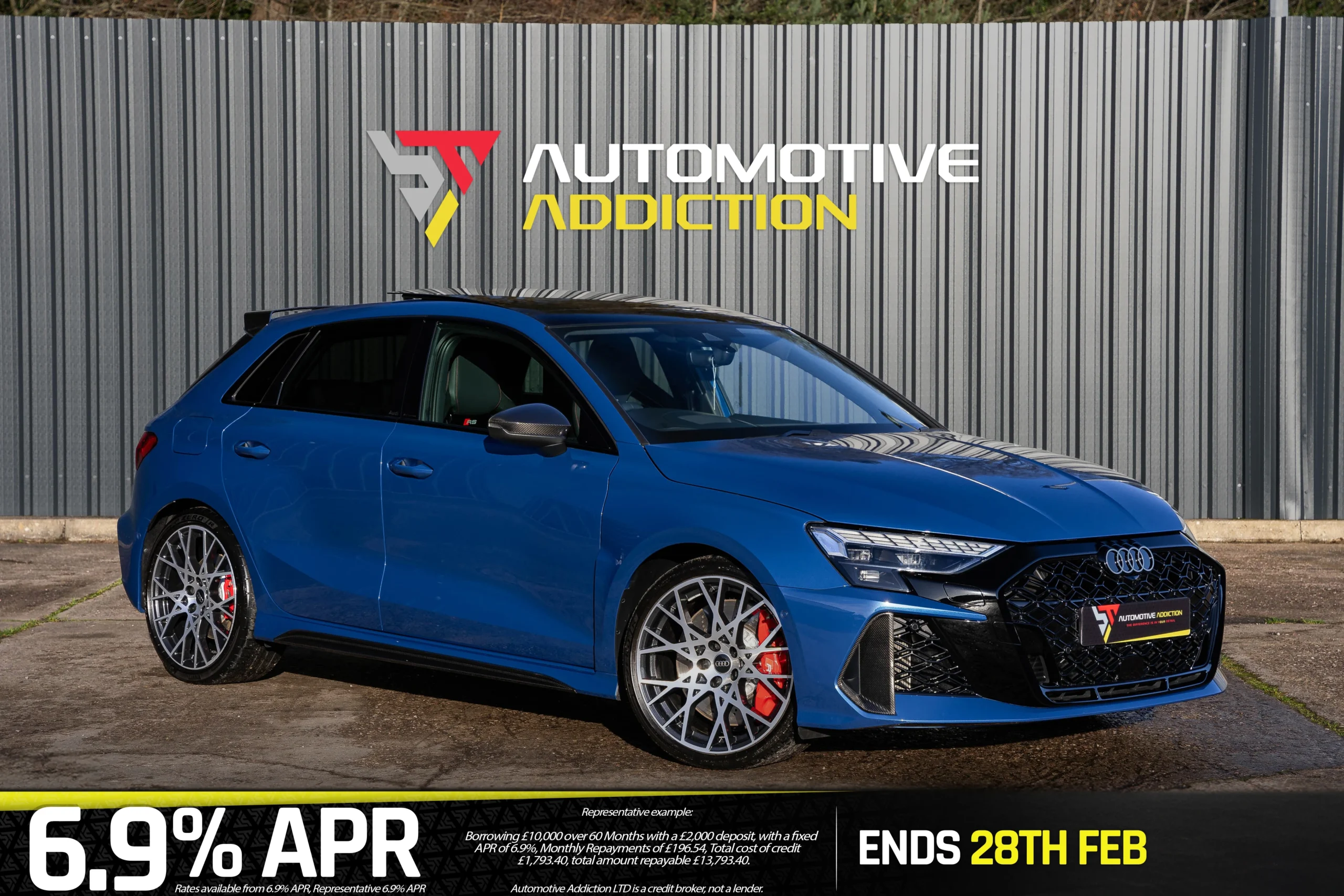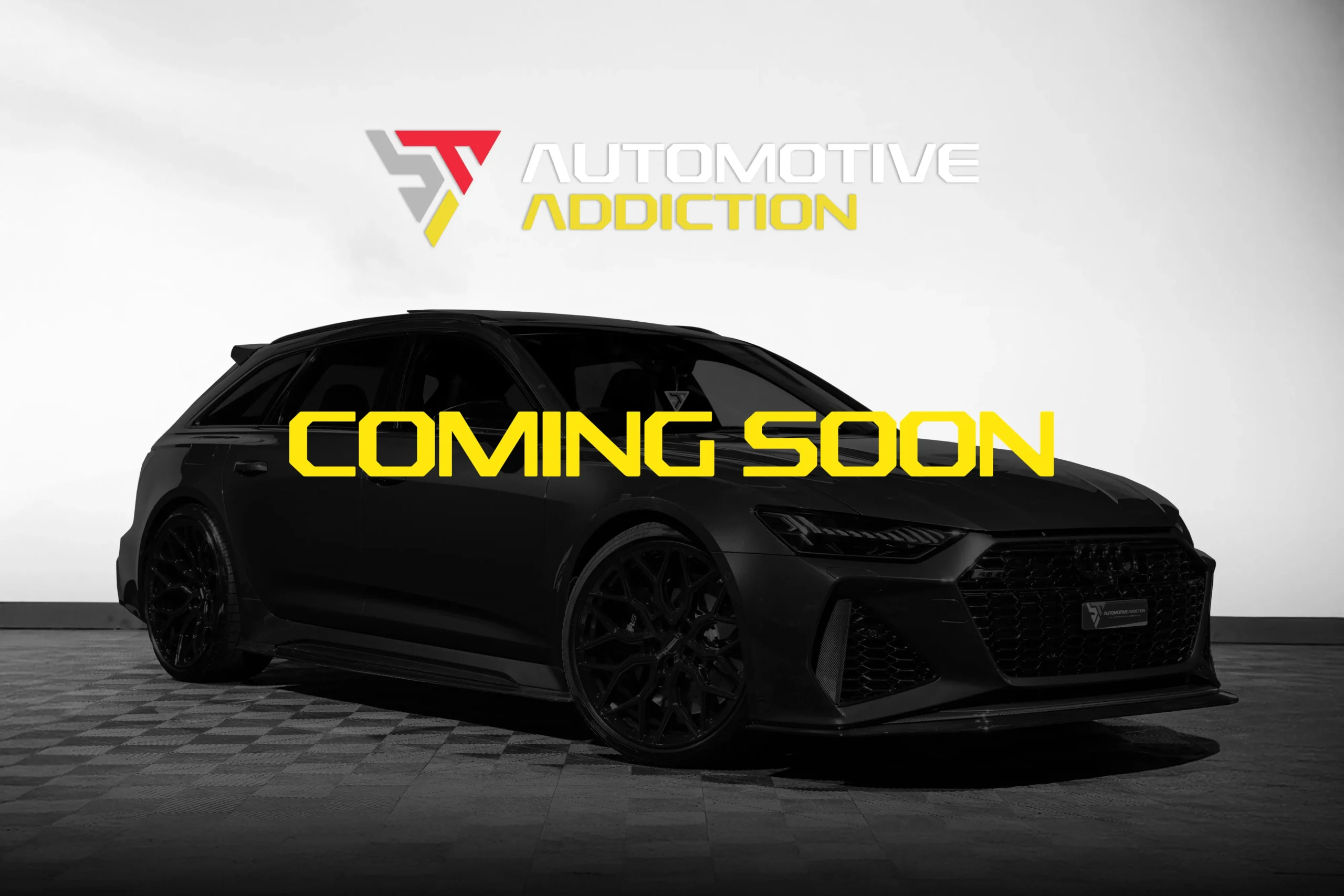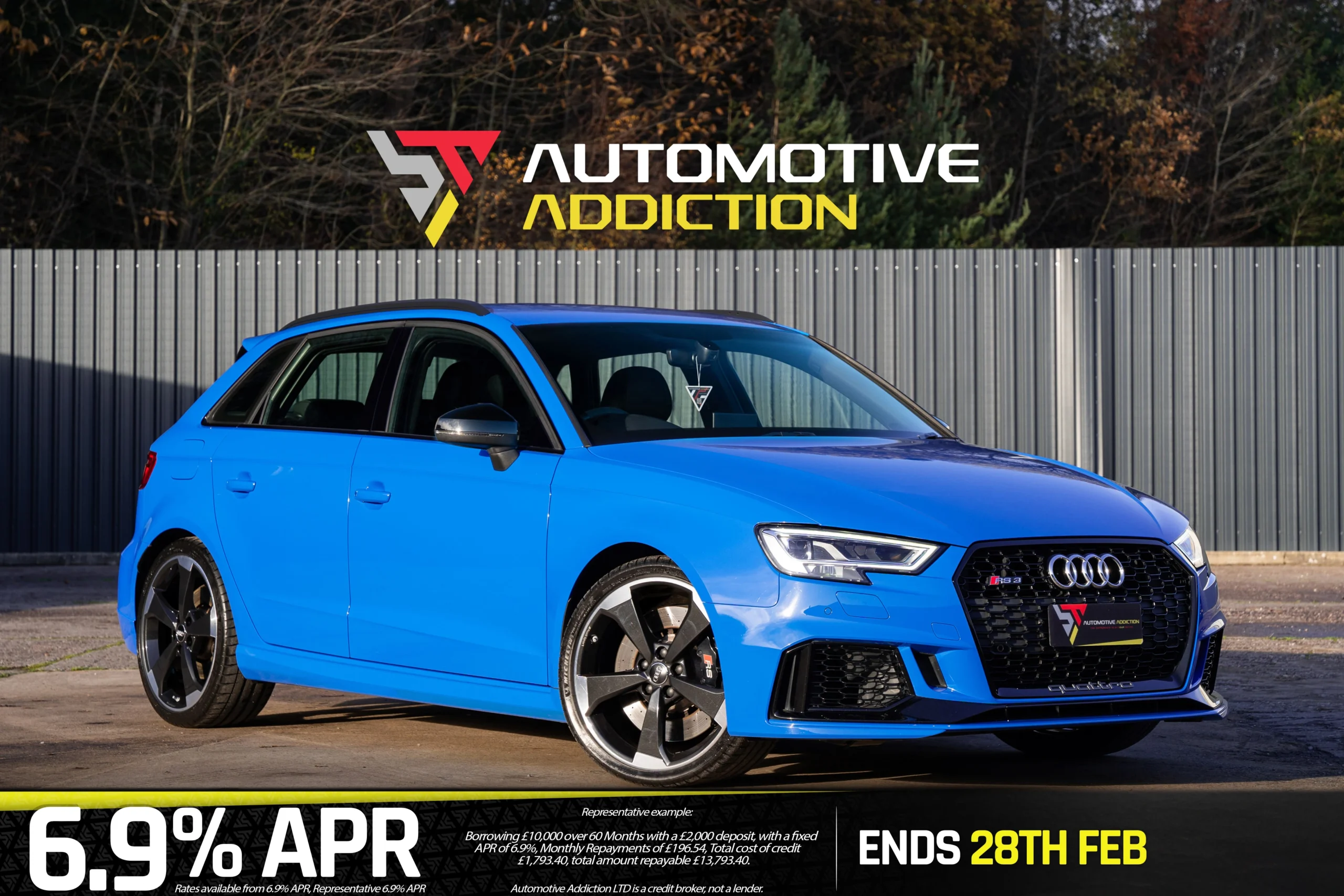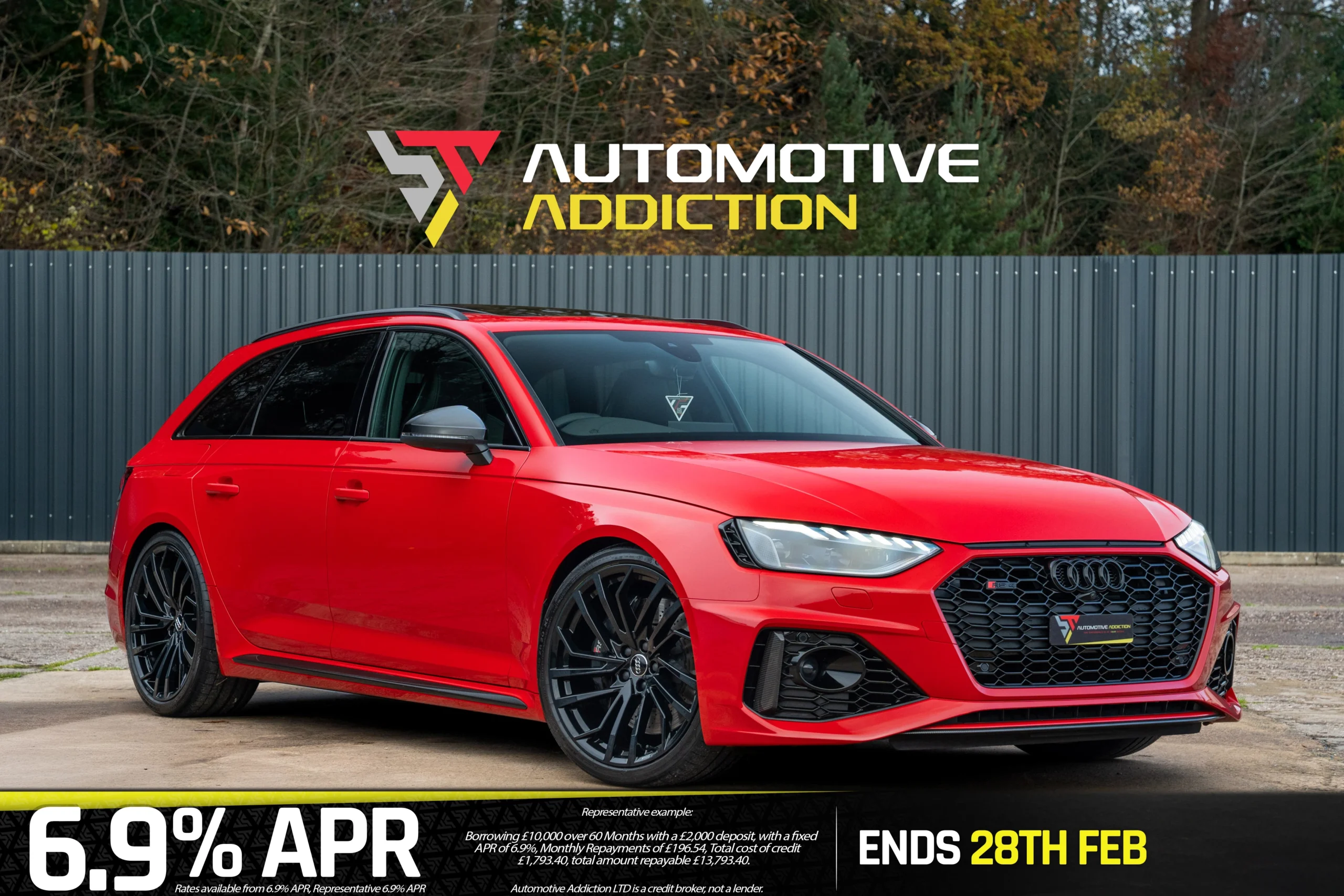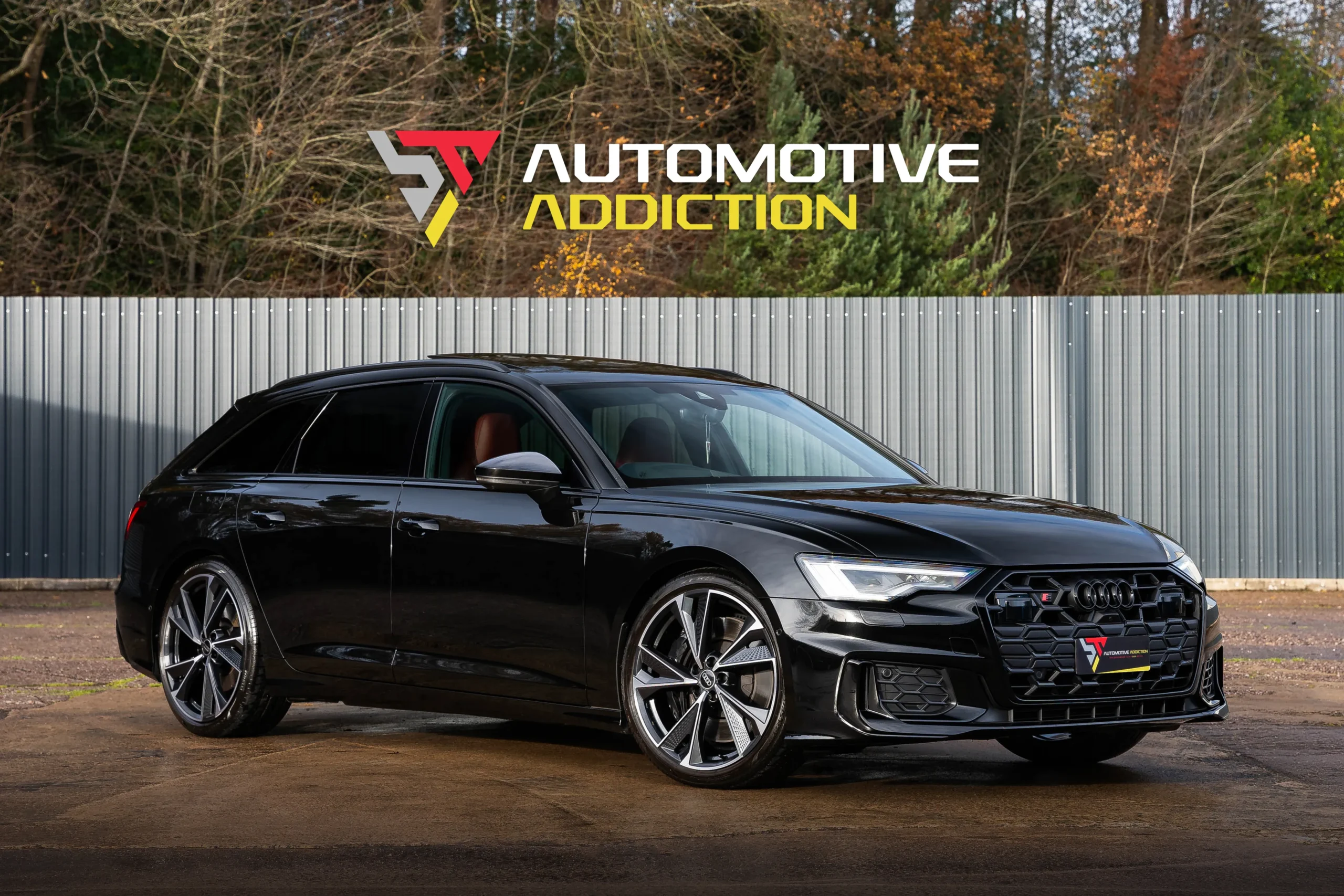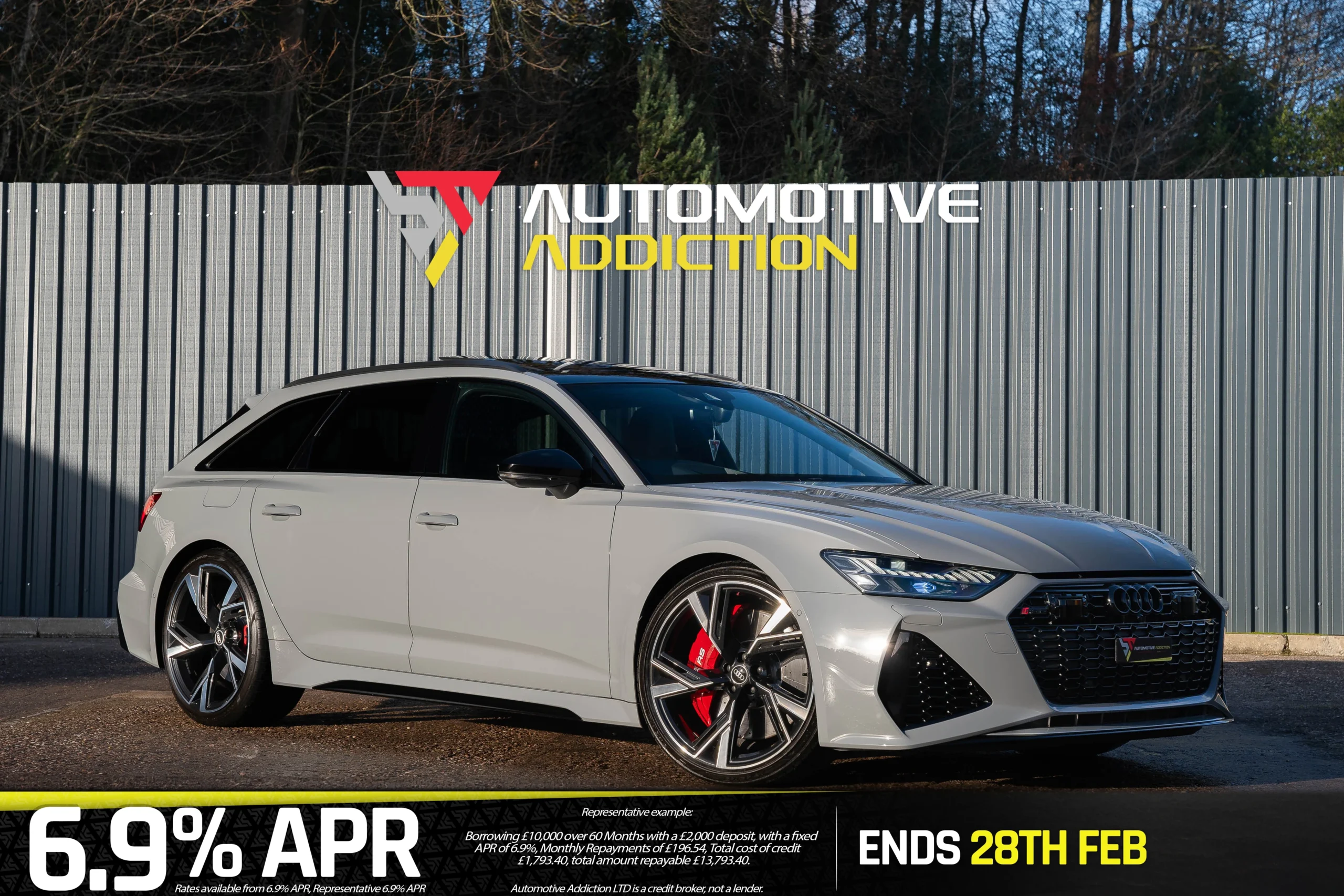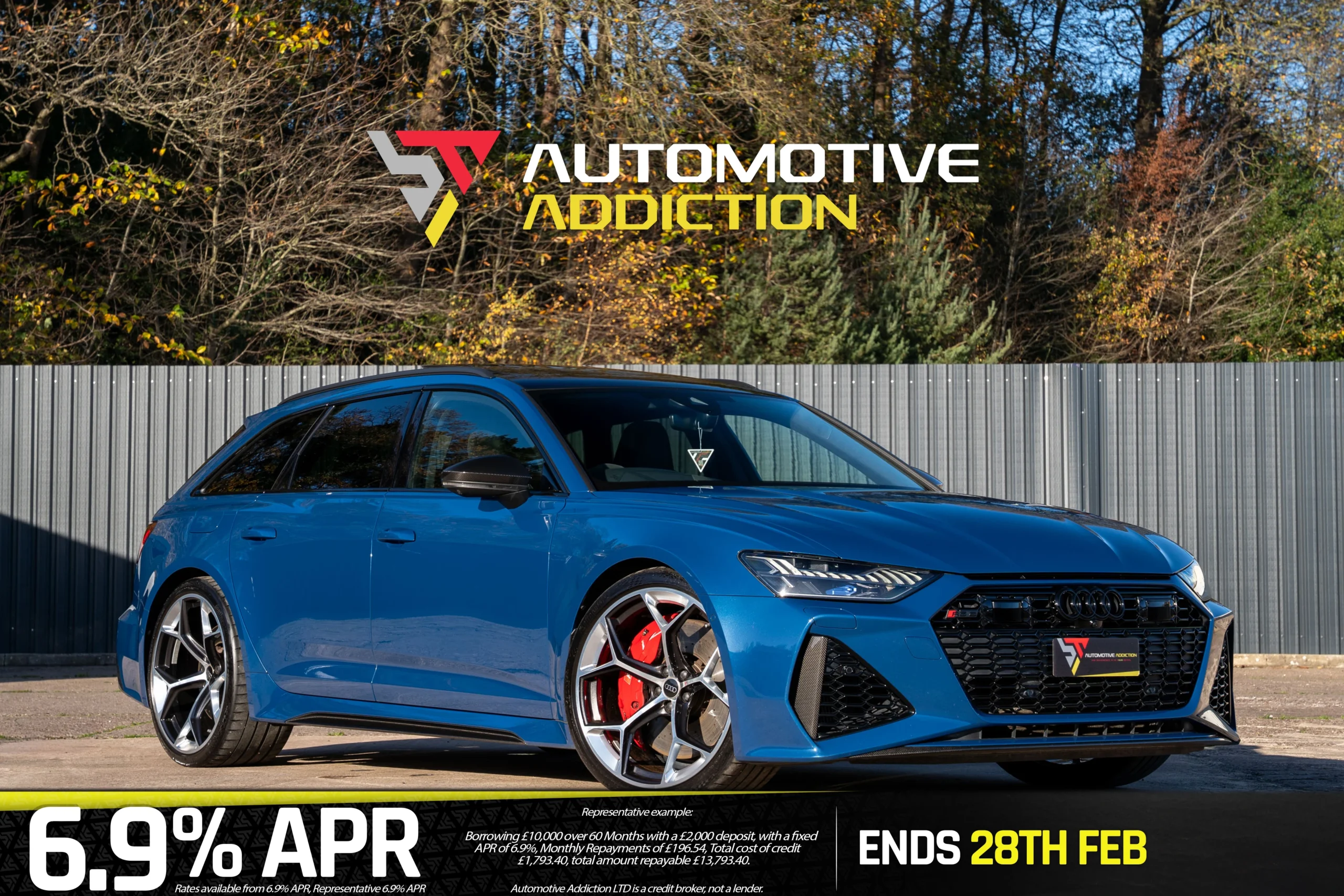BMW’s latest weapon from the M division stable is here – the 2025 BMW M2 CS, and it’s gunning for the sweet spot in the performance car hierarchy. Sharper, lighter, more focused, and significantly pricier than the standard M2, the new CS seeks to blend hardcore dynamics with daily usability. But how does it stack up against both its premium hot-hatch rivals like the Audi RS3, and its in-house siblings like the M3 and M4?
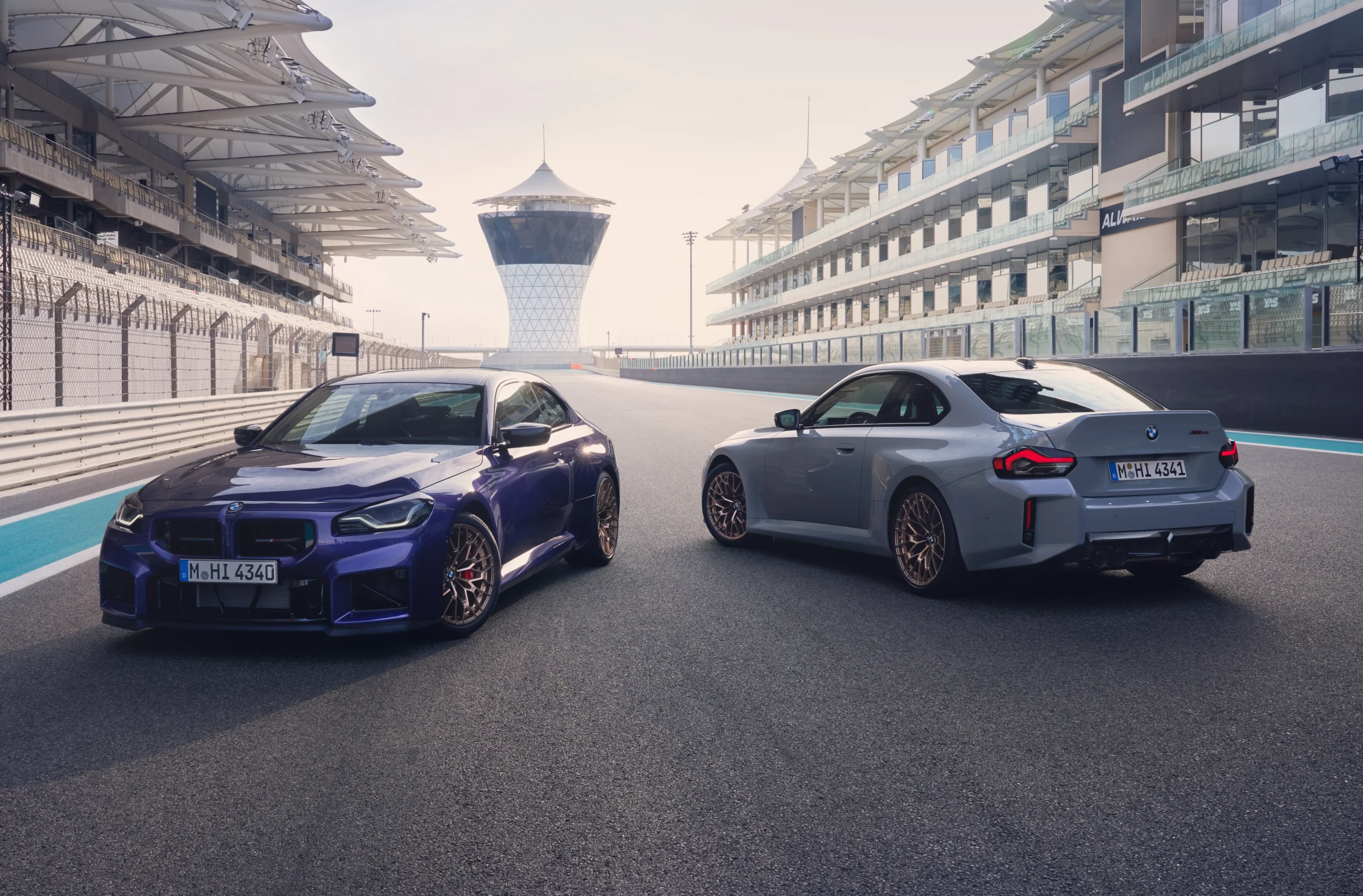
What Sets the M2 CS Apart From the Standard M2?
Let’s start with the basics. The 2025 M2 CS builds upon the solid foundation of the already potent G87 M2, which arrived on the scene in 2022 and is itself no slouch. Many BMW fans thought a hotter Competition variant would be the next model to top the M2 range, but BMW has seemingly skipped this step and gone straight for the full fat M2 CS instead.
The CS badge was first applied to the back of a BMW in 2005, where it featured on the rump of an E46 generation M3, where the formula was to take the best bits of the ultra-hardcore CSL and apply them in a more usable package. Since then, the CS badge has always been an indicator of something special and the latest M2 variant continues the theme.
Priced at £86,800 the M2 CS is £18,095 more than the standard M2, but you do get a host of powertrain and chassis upgrades to complement its more aggressive aesthetic, which includes a deeper front bumper and splitter as well as stripped back kidney grilles and a ducktail bootlid.
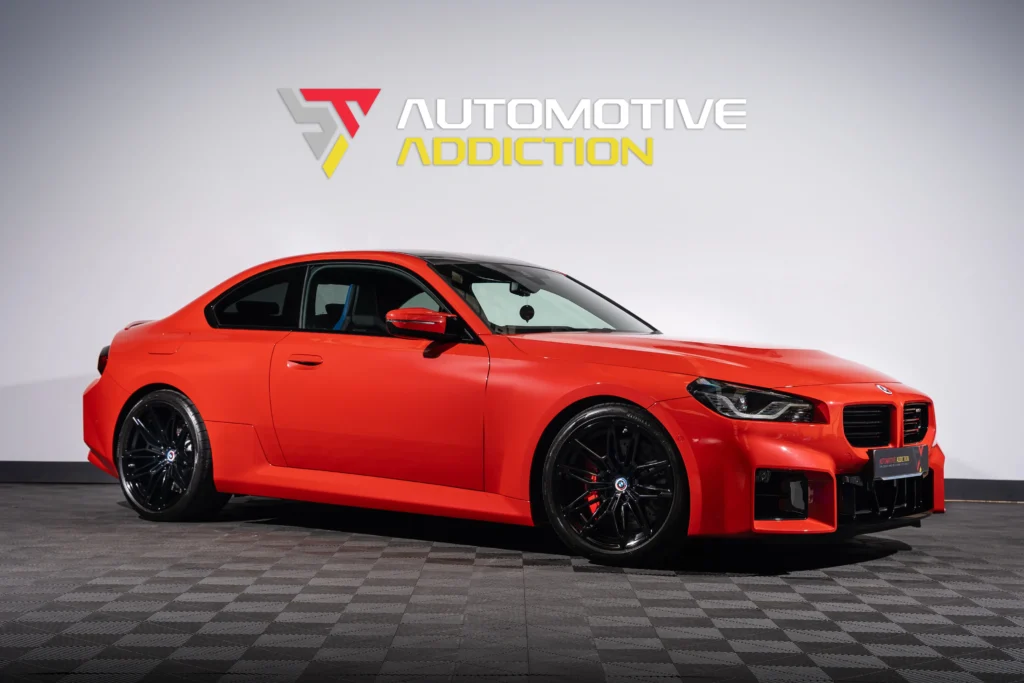
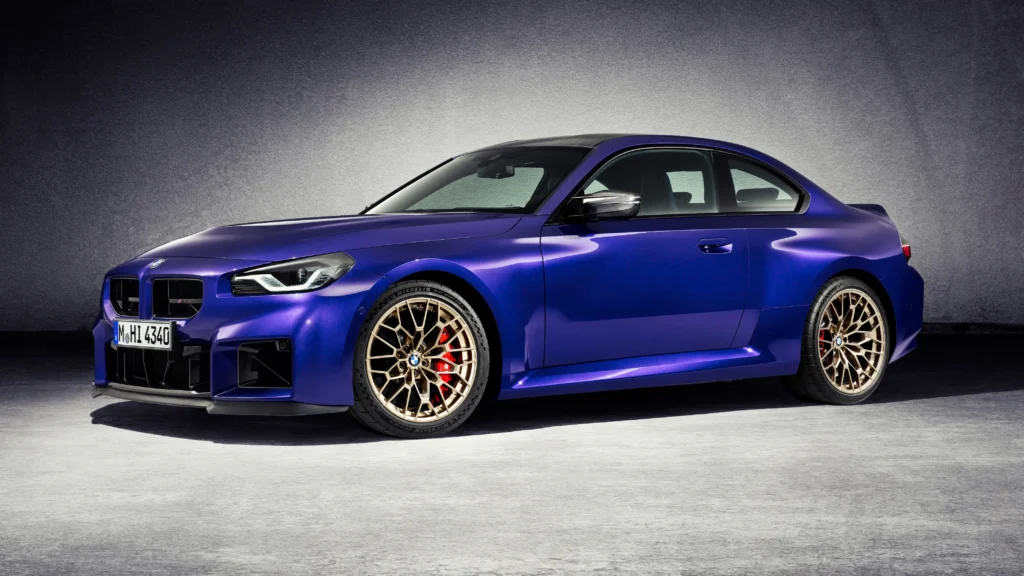
As with previous CS models such as the old M2, the previous generation M5 and the current M3 and M4, there is a noticeable power increase. Compared to the standard M2’s 473bhp and 600NM of torque, the CS’s S58 3.0-litre twin-turbocharged straight-six engine is packing a visceral 526bhp and 650NM. That’s a full 82bhp more than the old M2 CS, a car that was hardly lacking in white knuckle inducing performance.
These new figures are produced by the CS’s pair of mono-scroll turbochargers, a 350-bar injection system and variable valve and camshaft timing. To ensure durability, the straight-six gets a closed-deck crankcase and a forged crank, and there’s an iron coating on the cylinder bores. The cylinder head, meanwhile, has a 3D-printed core, and the oil system has been designed to work with the high cornering and acceleration loads the CS can generate. There’s also unique throttle mapping across all the drive modes.
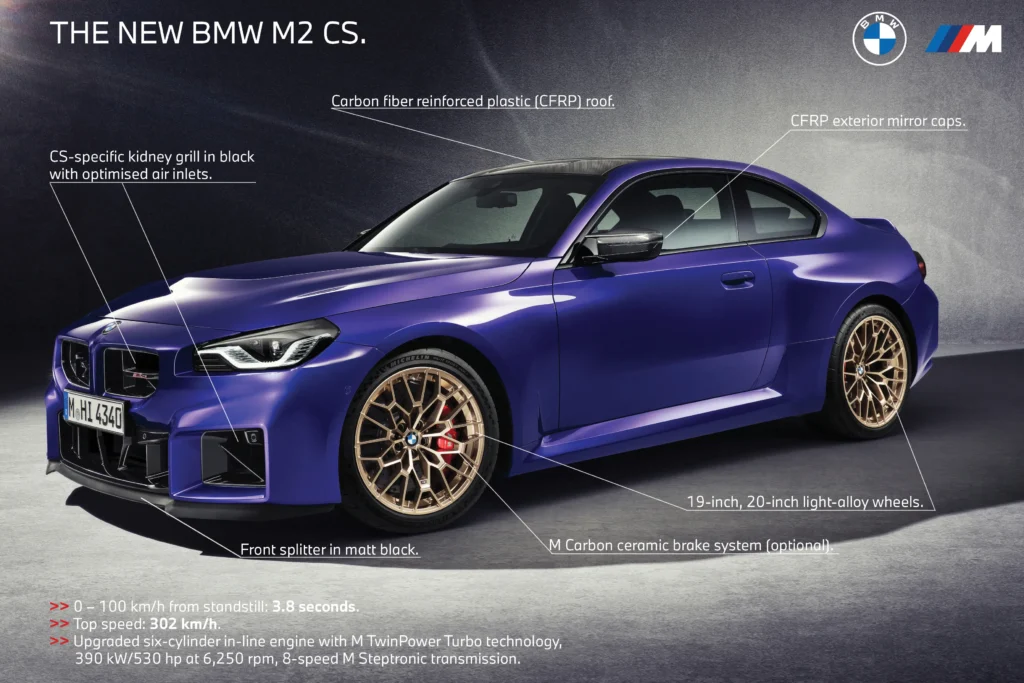
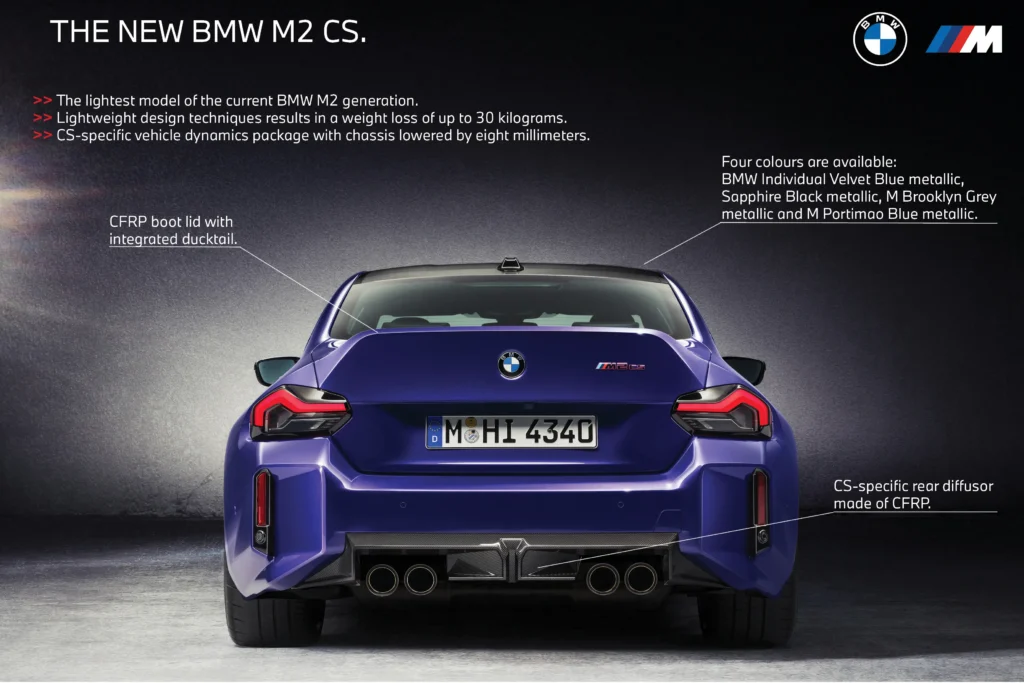
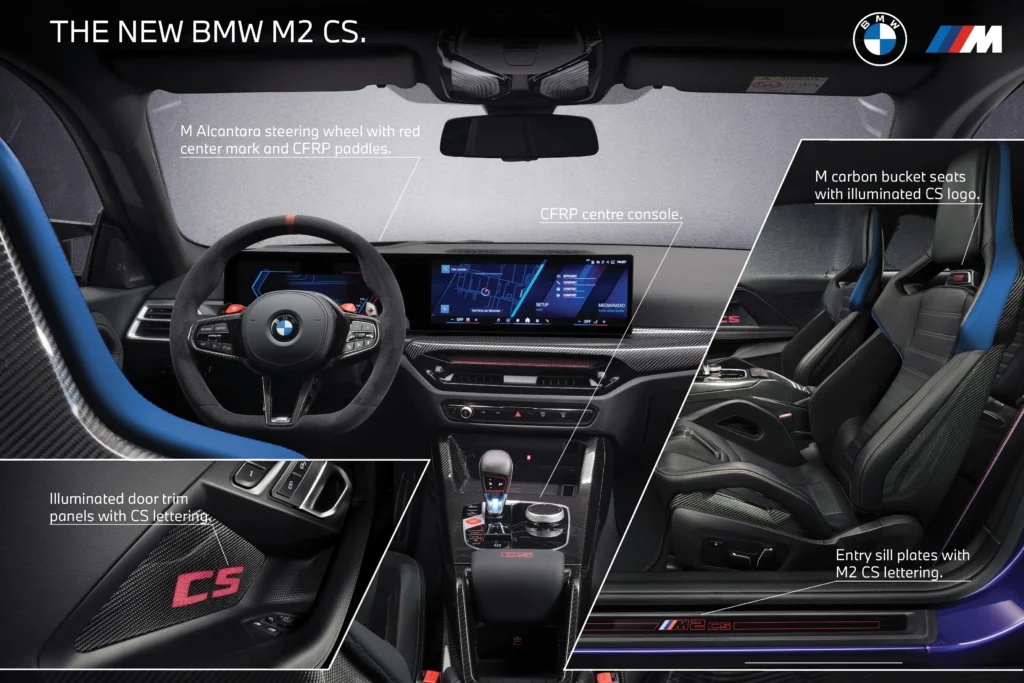
The brawnier engine can propel the M2 CS from zero to 62mph is just 3.8s – two tenths faster than a regular M2 Comp and 0.4s faster than the old M2 CS – with zero to 124mph completed in just 11.7s. Keep the loud pedal flat to the floor and, because the M Driver’s Pack comes as standard (a £9,500 option on the M2) the CS will top out at 188mph. A titanium exhaust system is available as an option through BMW’s M Performance parts catalogue for those who prefer the straight six’s histrionics turned up to eleven.
This blistering performance is delivered to the rear wheels via an eight-speed M Steptronic automatic gearbox with paddle shift – sorry manual lovers, there’s no stick shifting option for the CS, unlike the regular M2.
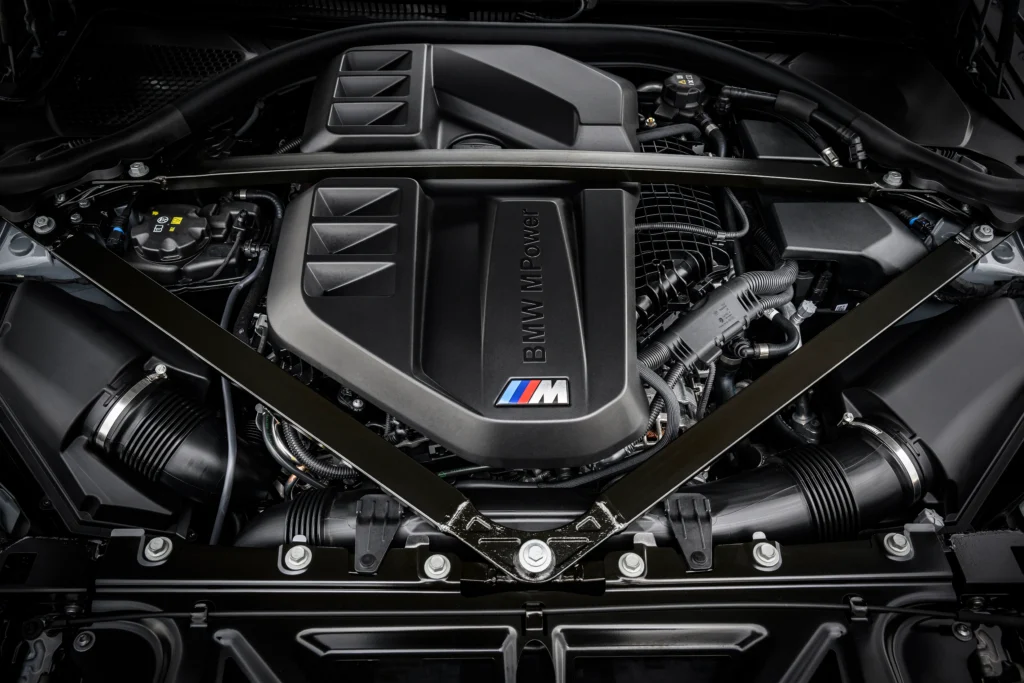
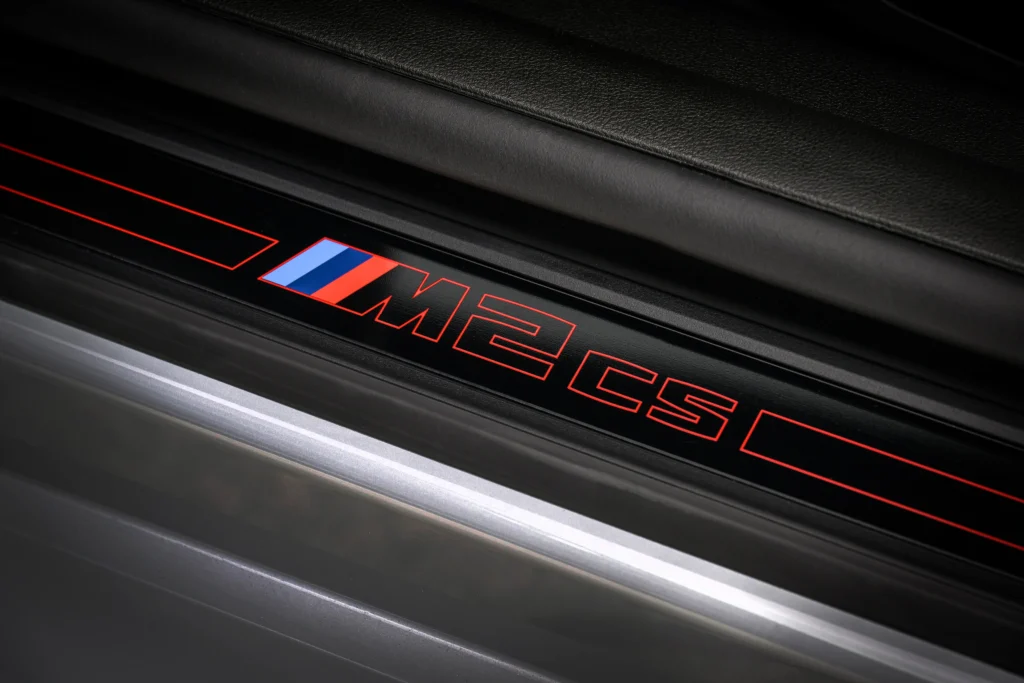
But the CS doesn’t just add power. BMW has focused on the full performance package: weight has been reduced by 30kg over the standard M2 through extensive use of carbon fibre (including the roof, rear diffuser and the ducktail boot lid, as well the centre console); the chassis has been sharpened with bespoke springs and dampers that sit the CS’s ride height 8mm lower; and the adaptive suspension features Comfort, Sport and Sport+ modes while the electronically controlled limited-slip differential has been recalibrated for track-focused driving. There are other toys to play with if you find yourself on a circuit, such as a ten-stage M Traction Control system and a Drift Analyser, which sounds like sideways sliding fun to us!
There’s also a set of exclusive lightweight forged wheels finished in matt Bronze and shod in Michelin Cup 2 tyres, giving the CS serious track-day credibility. The brakes have been upgraded too, with optional carbon-ceramic rotors, an option often reserved for much more exotic machines.
Inside, the M2 CS retains the well laid out digital cabin of the regular M2 but adds unique electrically controlled and heated carbon bucket seats, an Alcantara trimmed flat-bottom steering wheel, and plenty of CS-specific styling cues, while the muscular exterior can be ordered with paint finishes including Sapphire Black metallic, BMW Individual Velvet Blue metallic, M Brooklyn Grey metallic or M Portimao Blue metallic.
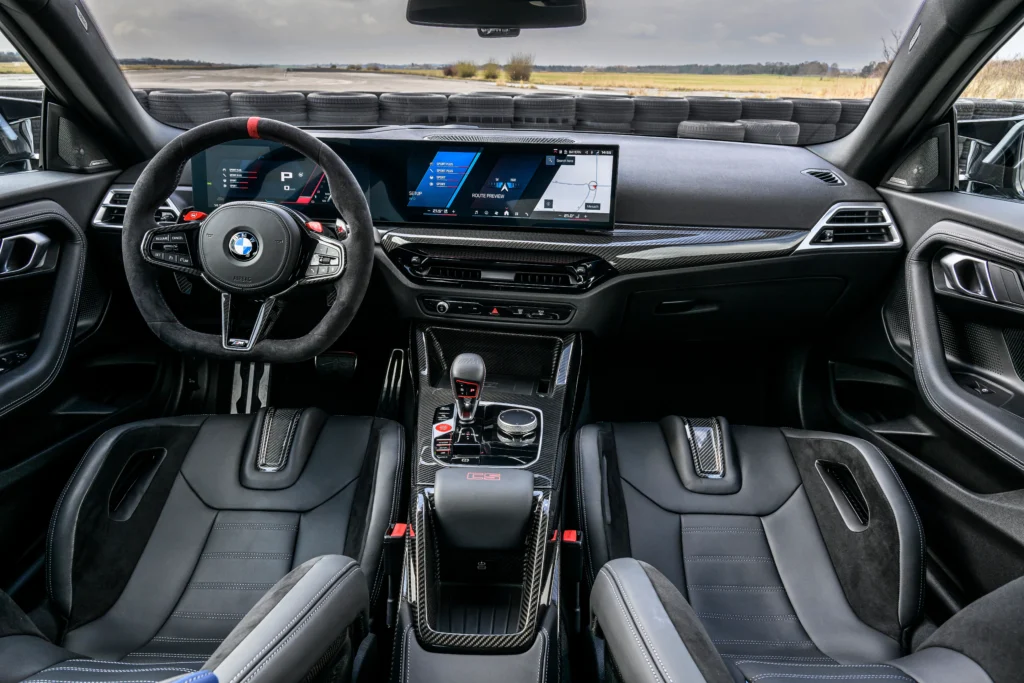
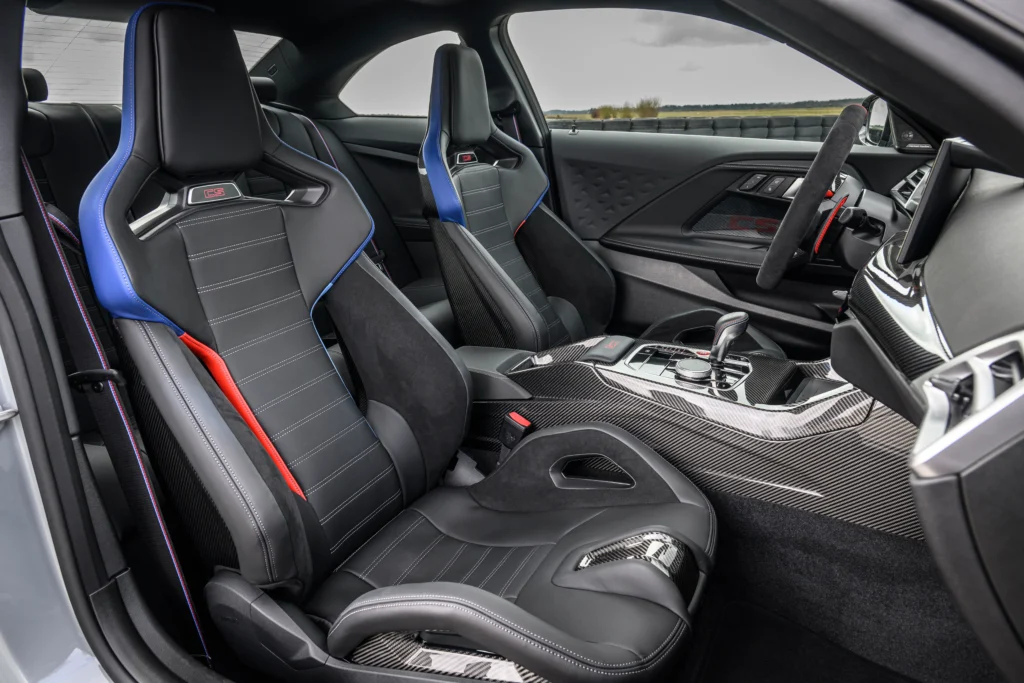
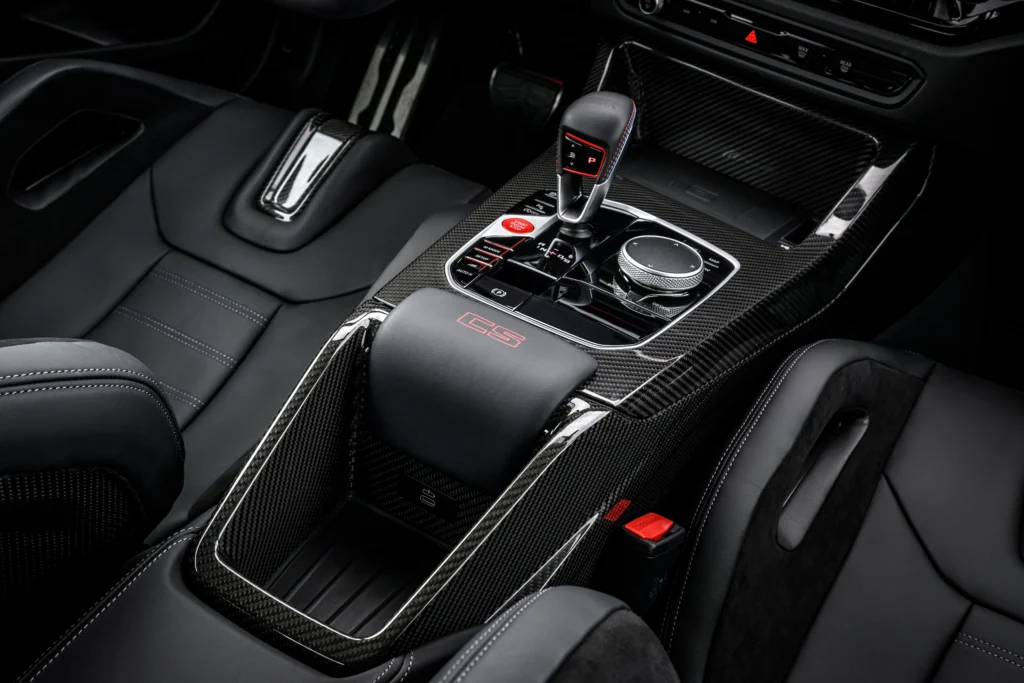
How Does It Compare to Its Rivals?
The Audi RS3 remains a more accessible entry point into the world of high-performance compacts. With its five-cylinder turbocharged engine delivering 401bhp and quattro all-wheel-drive, it’s grippy, quick, and effective in all conditions. However, the RS3 doesn’t offer the same level of driver engagement as the M2 CS.
The Audi is more comfortable, more usable year-round, and easier to drive fast in poor weather. But if your metric is driver connection and dynamic purity, the RS3 can’t match the M2 CS’s RWD layout and track-tuned setup.
The M2 CS is also significantly more expensive, pushing into £90,000 territory, while a well-optioned RS3 sits closer to £65,000. That’s a large gap, and one that’s hard to ignore if you’re focused on value.
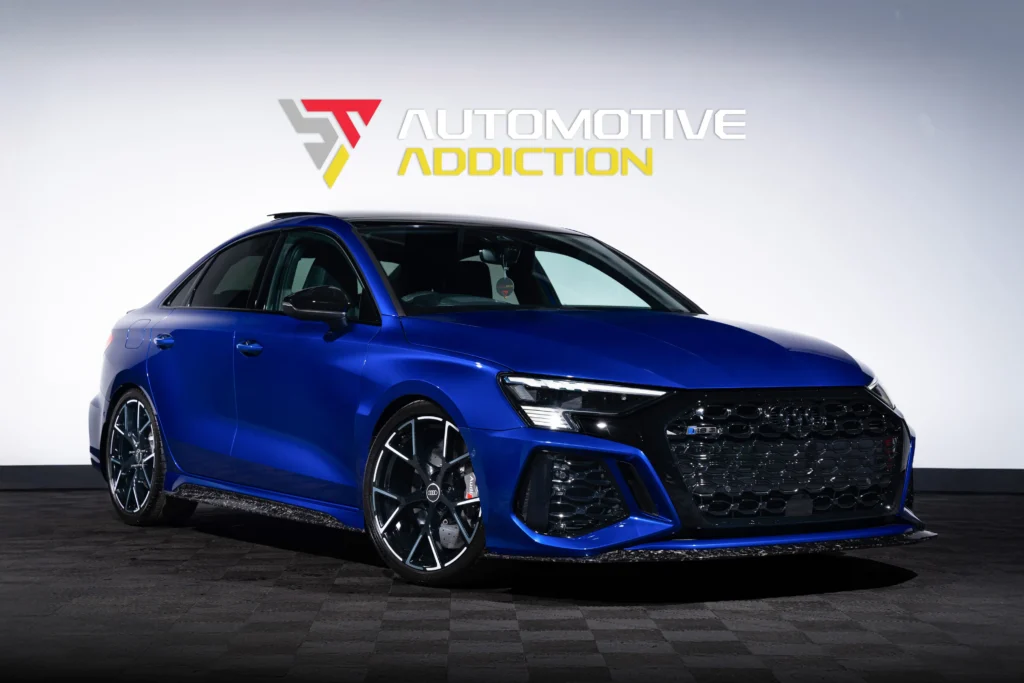
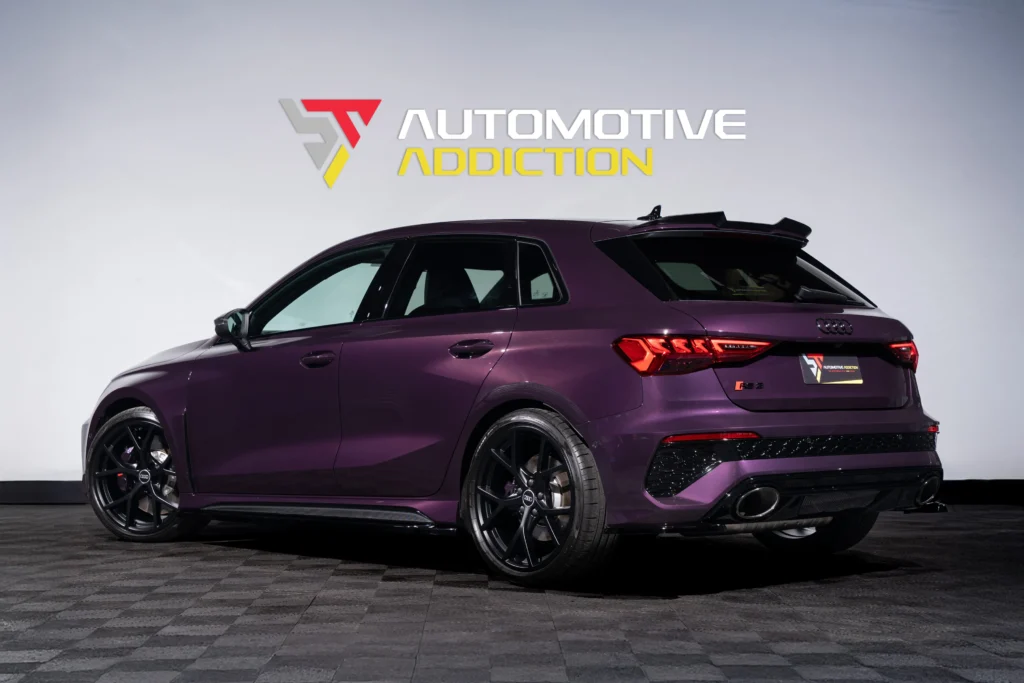
What about the M3 and M4?
Here’s where things get interesting. The M3 Competition and M4 Competition share the same S58 engine, and in xDrive spec, they offer better traction and marginally quicker straight-line performance. But they’re also larger, heavier, and notably more expensive.
A similarly specced M4 Competition with carbon ceramic brakes and lightweight wheels will set you back well into the £95,000-£100,000 range. And although the M4 offers more cabin space and comfort, it’s arguably less playful than the M2 CS. The smaller footprint of the M2 CS makes it more nimble, and its lower weight gives it a more responsive feel on twisty roads and technical circuits.
So, while the M3 and M4 are undoubtedly more grown-up performance cars, the M2 CS might actually be the more engaging and fun option – at a lower price point.
Is It Worth the Premium Over the Regular M2?
The standard M2 remains one of the best enthusiast bargains on the market, especially with a manual transmission. It delivers serious performance and classic M-car vibes for around £65,000.
The CS version, at nearly £20,000 more, is harder to justify purely on paper. But the upgrades are substantial: the improved chassis, weight reduction, better brakes, and more powerful engine make it feel like a different car, not just a tarted-up trim level.
If you’re someone who values track time, handling finesse, and the finer points of driver engagement, the CS is likely worth the stretch. However, if your driving is 90% road and 10% spirited backroad fun, the standard M2 gets you most of the way there for significantly less.
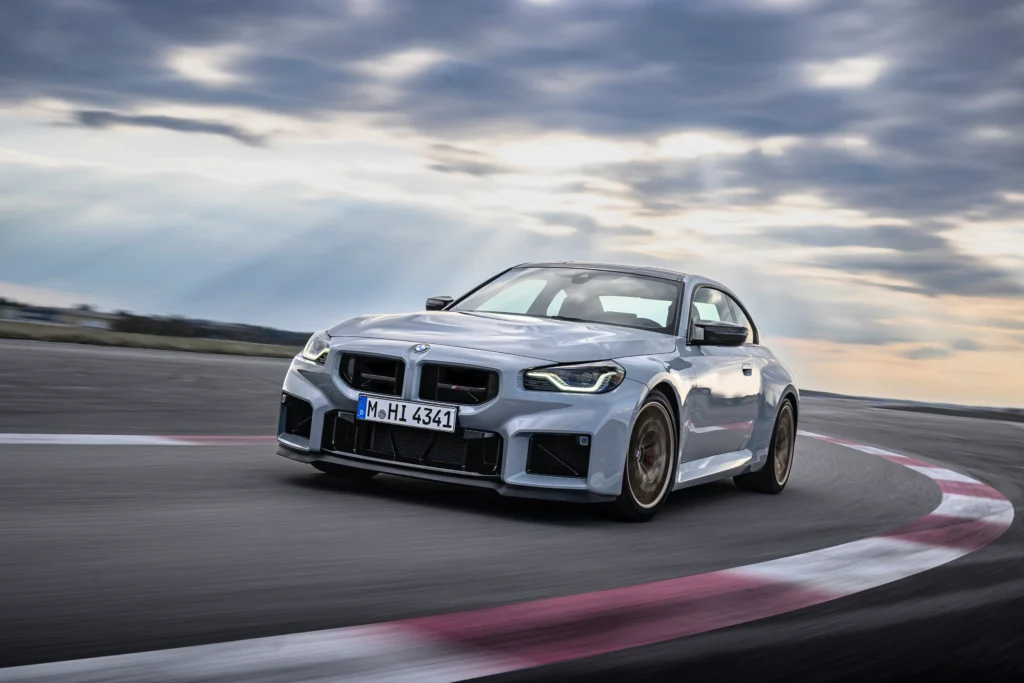
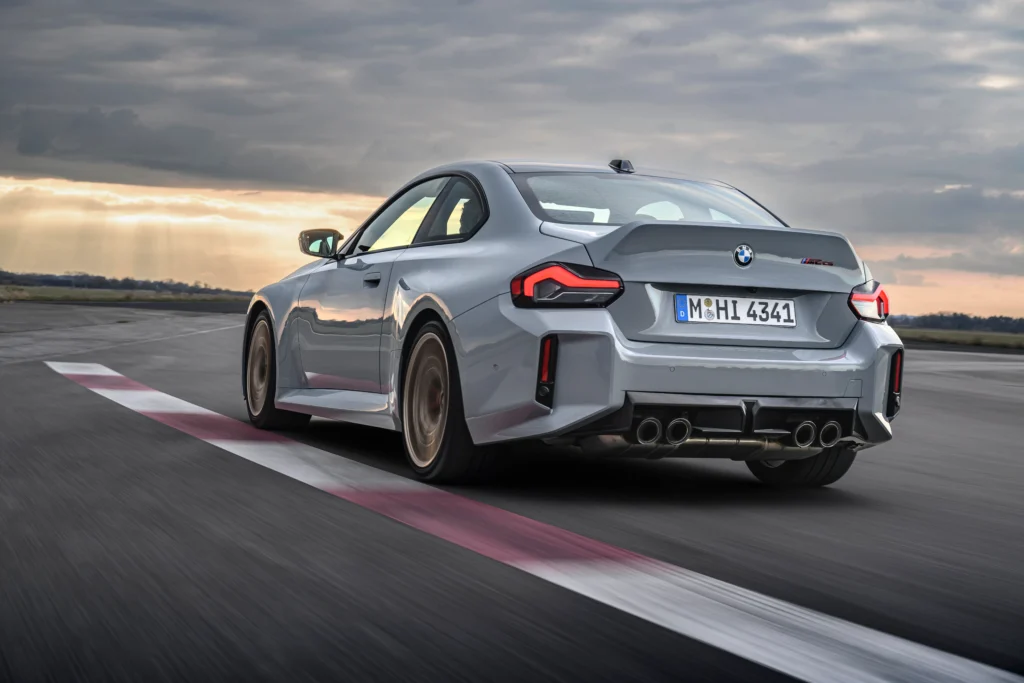
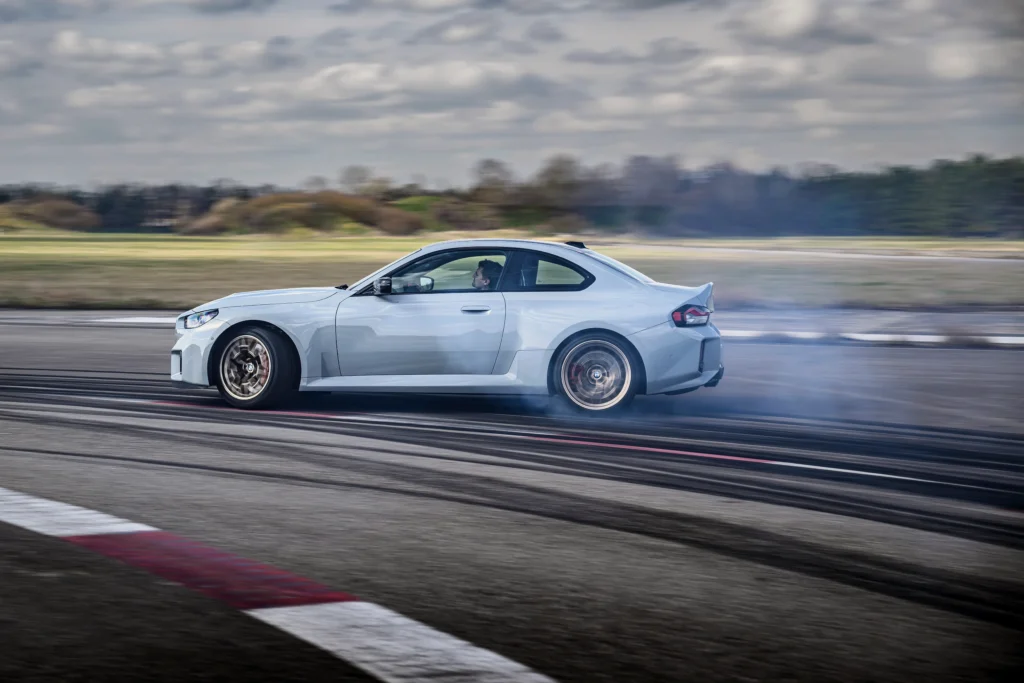
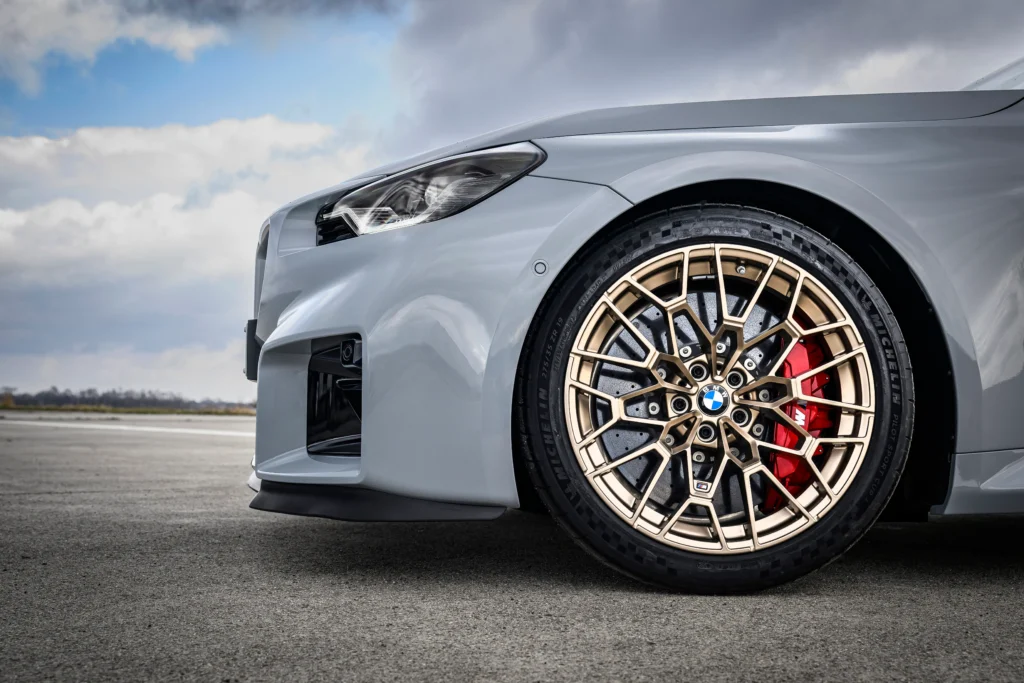
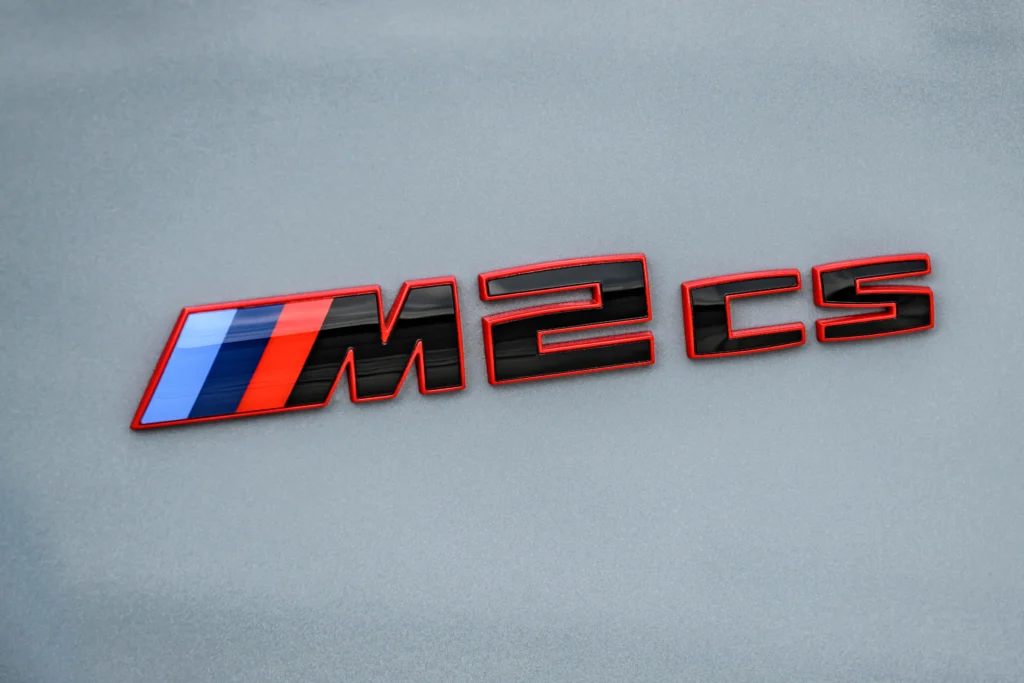
The 2025 BMW M2 CS hits a rare performance sweet spot: more special and capable than the regular M2, but less compromised and expensive than the hardcore M4 CSL or fully-loaded M4 Competition. Against rivals like the Audi RS3, it offers a purer, more focused driving experience – albeit at a higher price.
For enthusiasts who want the essence of M in a compact, rear-drive package – without the weight or cost of the larger M cars – the new M2 CS might just be the best M car you can buy today.
We Want Your BMW M Car!
Do you have an immaculate examples of one of BMW’s iconic M cars? If so, and you’re thinking of selling, then don’t hesitate to get in touch. We’re on the lookout for stunning BMW M cars to add to our stock list and will pay the very best prices for the very best examples. Don’t delay, call our sales team today to see what we could offer you – Call 01952 780477 or visit www.automotive-addiction.co.uk for more information
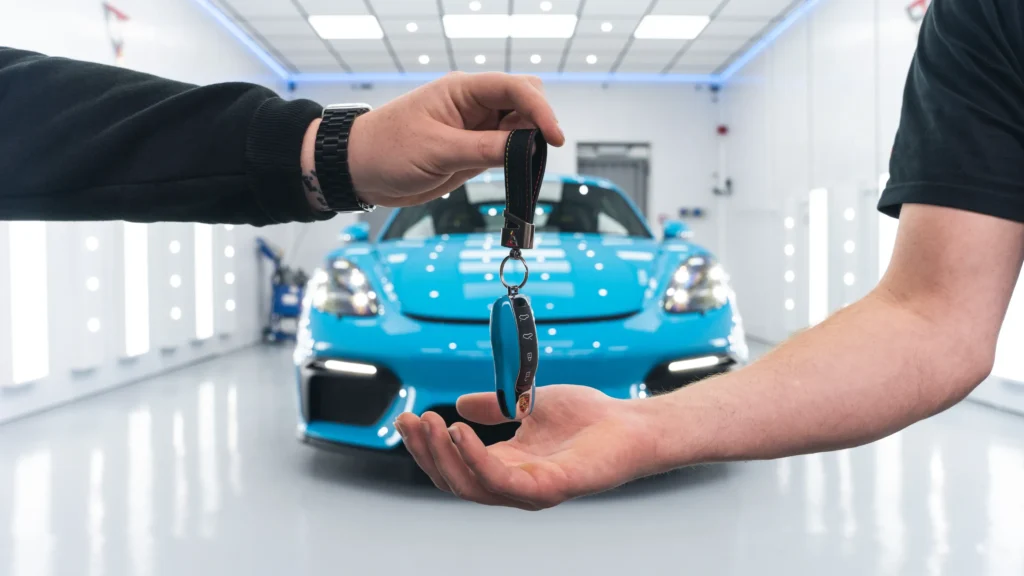
Sell Your Car with Automotive Addiction
- Free Bespoke Evaluation
- Drop-Off or Collection
- Instant Payment with Finance Settled

